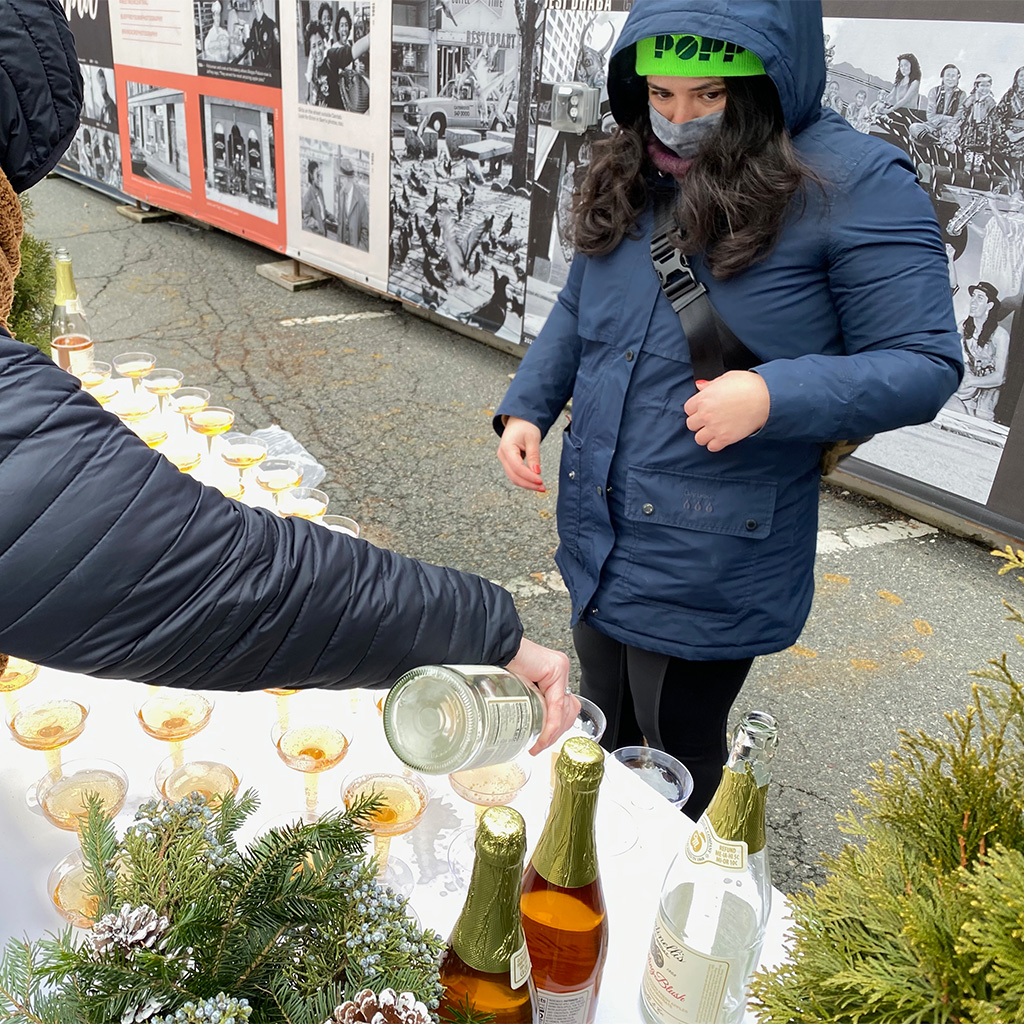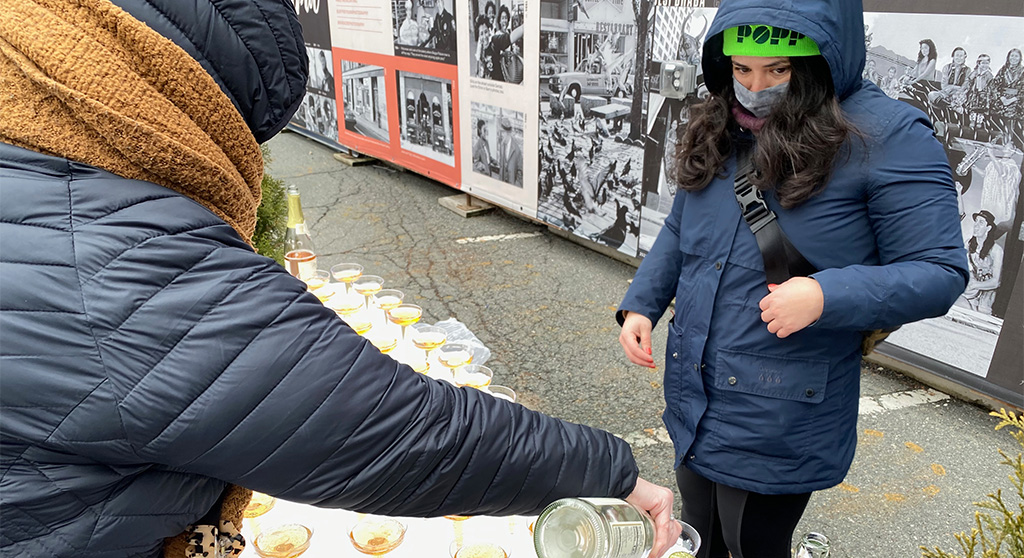Reimbursement approach to Covid relief funds keeps most nonprofits in Cambridge waiting

Nina Berg checks on preparations for a City Council inaugural event Jan. 3, 2022, at Starlight Square in Cambridge’s Central Square. (Photo: Marc Levy)
Cambridge nonprofits are still waiting to get American Rescue Plan funds more than a year after award letters arrived showing their approved amounts. Nonprofits report slow communication and years of waiting for thousands of dollars that they first must show proof of spending before the city is able to reimburse them.
The slowdown is due to many factors on both the city and community side, including the transition to a new city manager, changing regulations around those Covid pandemic relief funds and strains on city resources, as well as waiting on nonprofits to show invoices that indicate all of the money requested is spent before reimbursements can begin.
Because the wait has been so long, community leaders such as Nina Berg and Matt Boyes-Watson of Flagg Street Studios, a creative studio that supports nonprofits, have had to find alternative ways to support one of their approved projects, Popportunity, a program that provides small business with low-cost, temporary retail spaces.
“Because Popportunity didn’t and hasn’t received money in the last year-plus, we’ve had to go find other sources of funding to maintain the program,” Berg said. “We’ve gotten grants, but we imagine that for people who are planning to receive that money in 2023, a lot of those projects just didn’t happen.”
They applied for Arpa in January 2022 and were approved for $150,000 in July 2022, according to Boyes-Watson. Both met with city officials to discuss next steps this April, and have been in communication since with the city trying to finalize paperwork and get reimbursements to fulfill their commitment.
“We received our contract for our grant agreement in late August and we’ve completed that, and now we’ve submitted for our reimbursement last week, and we hope to hear back soon,” Boyes-Watson said.
In total, $88.1 million is available to the city of Cambridge in Arpa funding; approximately $28.4 million of that was allocated to nonprofits by July 5, 2022.
The money is awarded through reimbursements – meaning nonprofits that submitted budgets with timelines can request their Arpa funds by invoicing the city and showing proof of payments. “If it’s for funds that are still going to be incurred in the future, we have to wait for those funds to be spent before we can reimburse,” said Matt Nelson, assistant to the city manager.
Most projects still pending
Twenty-five Cambridge nonprofits were approved for ARPA funding; 11 of those have a full grant agreement and are eligible for reimbursement, and 14 are in the “pending phase,” according to Nelson, who’s been in direct communication with approved nonprofits since February of this year.
Since the slowdown, “I have been in touch with every nonprofit and continue ongoing conversations with everyone who has a project proposal with the city,” Nelson said. “If there’s an organization where the city is working to finalize, or it’s in the city’s inbox, we’re working on that and whenever we have it finalized, I report back to the nonprofit.”
When asked about the possibility that some nonprofits may not be able to show proof of spending for the thousands of dollars they were approved for in reimbursements, communications director Jeremy Warnick said the city is “working with organizations to ensure that they meet requirements and maximize the amount they were awarded.”
The city has until Dec. 31, 2024, to allocate all of its Arpa money for eligible costs incurred starting March 3, 2021; awardees must spend all allocated money by Dec. 31, 2026.
Delight and disappointment

Eric Grunebaum, left, at Jerry’s Pond in Cambridge on April 23 with city councillor Quinton Zondervan and Peter Crawley. (Photo: Peter Crawley)
The Rev. Lydia Shiu, director of social justice and action at Reservoir Church in North Cambridge, thought the process was done “extremely well.” She applied in January 2022 for $10,000 for the organization’s soccer nights program and was granted the amount in an award letter in July 2022.
“Matt was really great and helpful in keeping me on point and even sending me updates when things were taking long, or prompting me if he hadn’t heard from me,” she said. “The whole line of communication was very spaced out, because things took long, but I never felt like it dropped off where I was waiting on something and I didn’t hear back.” Shiu plans to request reimbursement in the coming weeks.
Some nonprofits haven’t been so lucky. Friend’s of Jerry’s Pond in North Cambridge initially applied for funds late 2021 and was notified of its award of $600,000 in July 2022. Eric Grunebaum, the organization’s leader, had proposed to use the funds to return the land to recreational use and had been working with several groups to fit the project within Cambridge’s sustainability goals.
The award was redirected in April 2023 in favor of a plan to build a pedestrian bridge to connect Rindge Avenue and Danehy Park. “It’s nice that the city is thinking about a bridge, we support that too,” Grunebaum said. “But it’s not a substitute for how people live their daily lives walking and biking through Rindge Avenue.”
A second chance
Within the nearly $30 million allotted to nonprofits sits the $6 million allocated to the Cambridge Nonprofit Recovery Fund, spearheaded by the Cambridge Nonprofit Coalition, that awards applicants with up to $150,000 in Arpa funding to cover losses from the Covid pandemic.
Conversations about the Nonprofit Recovery Fund began materializing in the fall of 2022, when members of the coalition, including executive director Elena Sokolow-Kaufman, identified challenges posed to nonprofits described in a Cambridgewide survey report released in December. Eighty applications were submitted to the fund alone between this May and July.
“We wanted to create a space where there was greater access to these resources, and if [nonprofits] weren’t able to apply through whatever process the city had set up, there was another opportunity,” Sokolow-Kaufman said. Once the award letters are sent out, which could be as early as next week, nonprofits will have to sign a contract and provide financial documentation to verify operating losses before funds can be allocated, but Sokolow-Kaufman predicts the money will follow in the coming weeks.
Different approach in Somerville
Unlike Cambridge, Somerville allotted its nonprofit Arpa funding in installments. The city got approximately $77.5 million in Arpa funds, $10 million of which was allocated to “various (nonprofit funding round)” organizations. Somerville also committed $2 million in funding to a Somerville Nonprofit Support Program that awarded $5,000 to $25,000 per applicant depending on the organization’s gross receipts.
Union Square Main Streets, a nonprofit organization that platforms local businesses, applied for funds this February, received its award letter in May and was fronted the first of four installments for its award in August, said Jessica Eshleman, the executive director, in an email. The other three installments are expected as reimbursements as USMS invoices the city.
Having access to the funds last summer would have allowed the organization to have a quicker impact on the square, said Zachary Baum, president of Union Square Main Streets, who intends to use the funds for a project called Keeping Small Strong that will increase small businesses’ budgets. “As [the city] announced the project, which took longer than we had hoped, it crystallized quite well,” he said. “I found that once they did have answers, they had very clear and well-communicated answers.”
“There’s a need going forward to figure out how to best support the [nonprofit] sector, because it really does impact services,” Sokolow-Kaufman said. “The Arpa conversation is certainly a piece of the puzzle. But there’s a larger picture here about resourcing these kinds of services in an ongoing and sustainable way.”
This post was updated Sept. 15, 2023, to correct that Union Square Main Streets has a project called Keeping Small Strong. A different name was given for the project in a previous version.


